- Home
- Humana Medicaid
- Kentucky Medicaid
- Medicaid extras
- Health and wellness
- Parents Home
- Para Padres
- A to Z Dictionary
- Allergy Center
- Asthma
- Cancer
- Diabetes
- Diseases & Conditions
- Doctors & Hospitals
- Emotions & Behavior
- First Aid & Safety
- Flu (Influenza)
- Food Allergies
- General Health
- Growth & Development
- Heart Health & Conditions
- Homework Help Center
- Infections
- Newborn Care
- Nutrition & Fitness
- Play & Learn
- Pregnancy Center
- Preventing Premature Birth
- Q&A
- School & Family Life
- Sports Medicine
- Teens Home
- Para Adolescentes
- Asthma
- Be Your Best Self
- Body & Skin Care
- Cancer
- Diabetes
- Diseases & Conditions
- Drugs & Alcohol
- Flu (Influenza)
- Homework Help
- Infections
- Managing Your Weight
- Medical Care 101
- Mental Health
- Nutrition & Fitness
- Q&A
- Safety & First Aid
- School, Jobs, & Friends
- Sexual Health
- Sports Medicine
- Stress & Coping
Pregnancy Slideshow (Mom & Baby)
What Changes Can I Expect During Pregnancy?
Here's a peek at what's going on inside your body during the amazing 40 weeks of pregnancy. Watch your belly — and your baby — grow!

Pregnancy Slideshow: Watch Your Belly Grow!
Do you know what changes to expect during pregnancy? View this slideshow to find out!
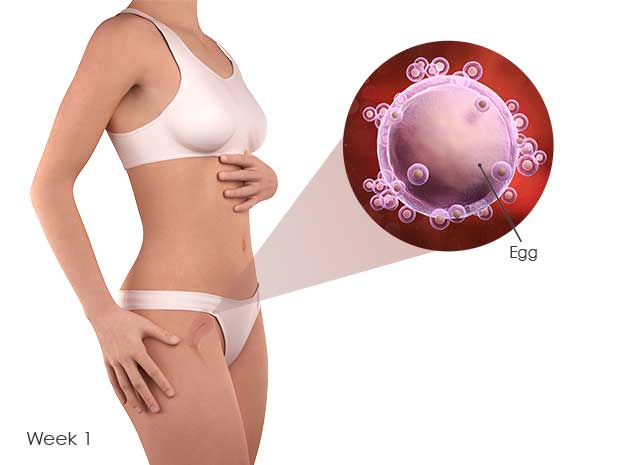
Week 1
Week 1 is actually your menstrual period. But because your due date is calculated from the first day of your last period, it counts as part of your 40-week pregnancy.
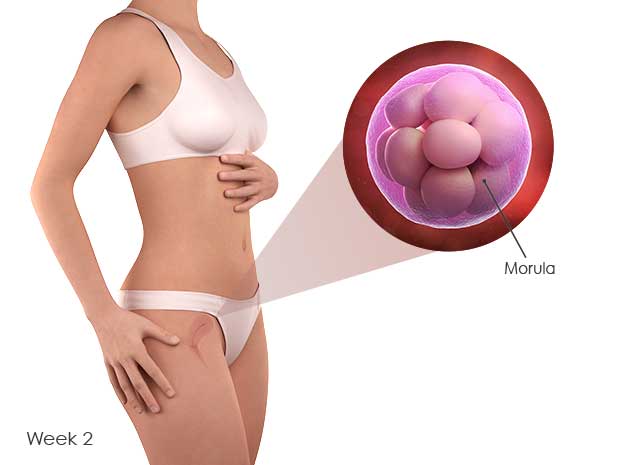
Week 2
You're most likely to get pregnant at week's end. It's the midpoint of a typical menstrual cycle, when the egg leaves the ovary. The first sperm to get inside the egg will fertilize it.
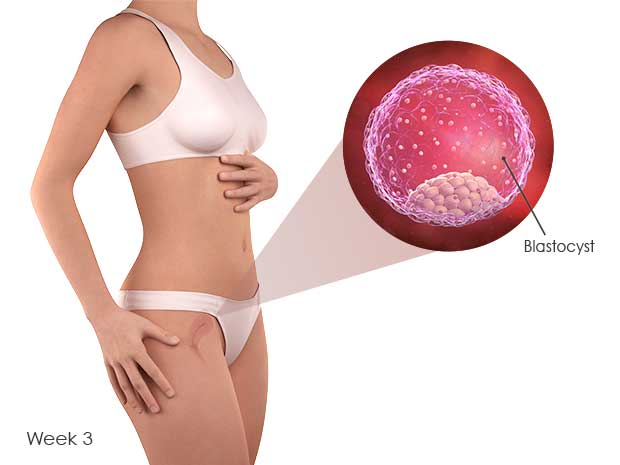
Week 3
You're pregnant, but you won't feel it yet! Your fertilized egg is now called a blastocyst and will attach in the lining of the uterus.
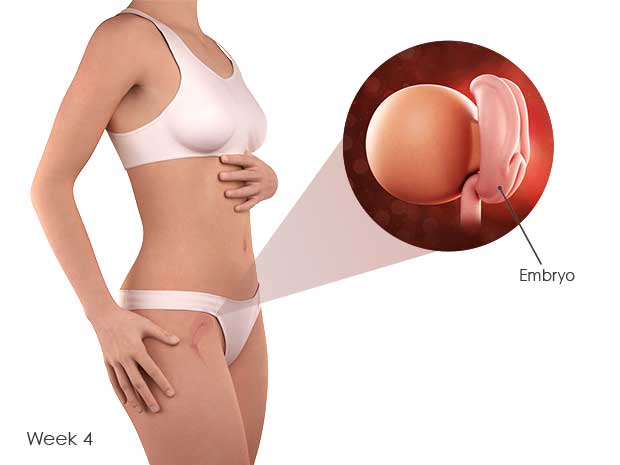
Week 4
Your body releases a hormone that will stop your monthly periods. This hormone can be detected in pregnancy tests. The end of this week is a good time to take a test and confirm! If you haven't already, begin taking prenatal vitamins.
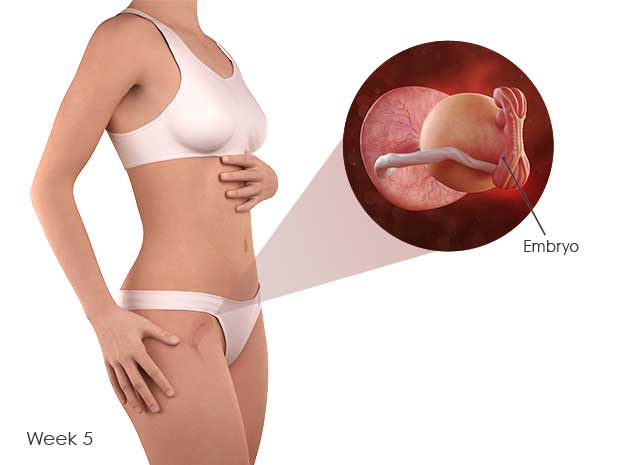
Week 5
For now, your embryo is nourished by the yolk sac until the placenta is fully formed in a few weeks.
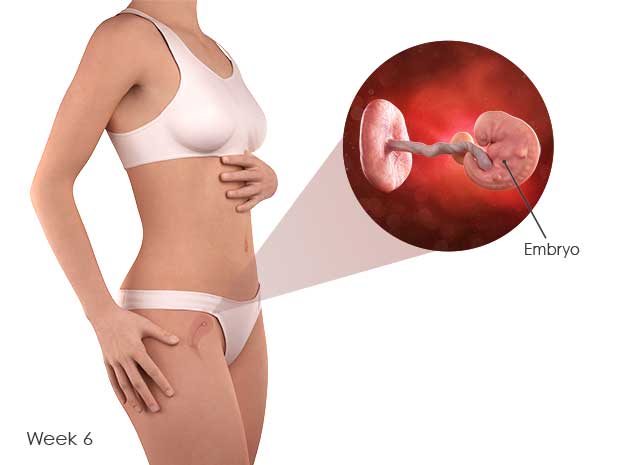
Week 6
Pregnancy symptoms usually kick in this week. You may feel tired, nauseated, or have sore or tender breasts. Knowing your little one's heart is now beating may help you look toward brighter days!
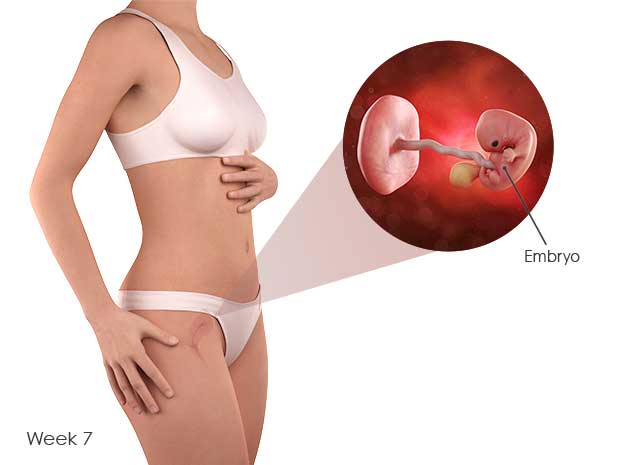
Week 7
Your cervix, the lower part of the uterus that connects your uterus to the vagina, forms a mucus plug. This helps prevent harmful bacteria from entering the uterus.
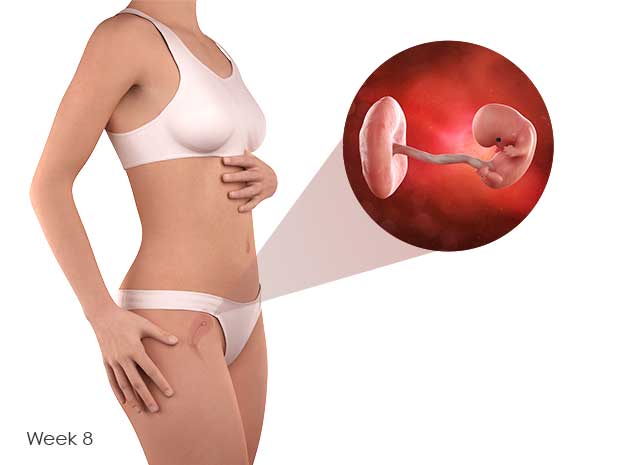
Week 8
The swelling in your uterus has probably made your favorite jeans too snug. Now's the time to think about buying maternity clothes. If you haven't already, schedule your first prenatal visit.
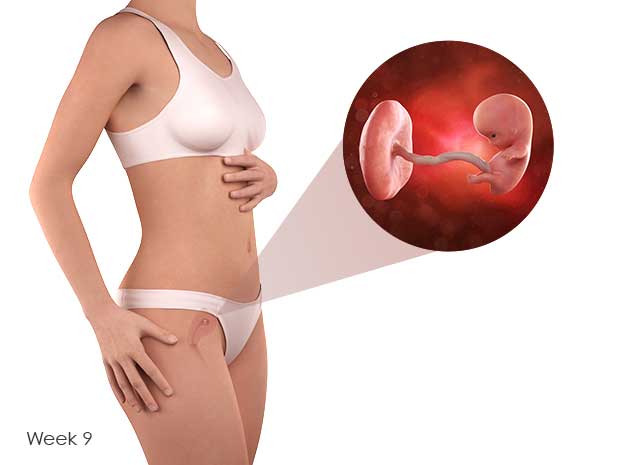
Week 9
Morning sickness doesn't just happen in the morning. If you're suffering, eat small frequent meals and ask your health care provider about other ways to ease symptoms.
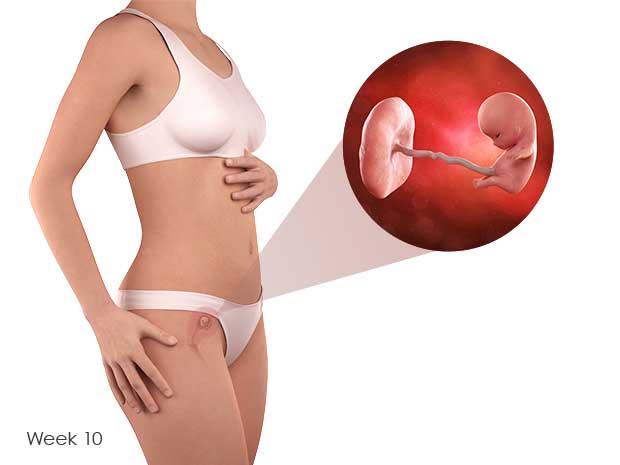
Week 10
At your first prenatal visit, you may hear your baby's heartbeat! You'll also have tests and checks, including blood pressure, urine testing, and a physical exam. Ask about any concerns.
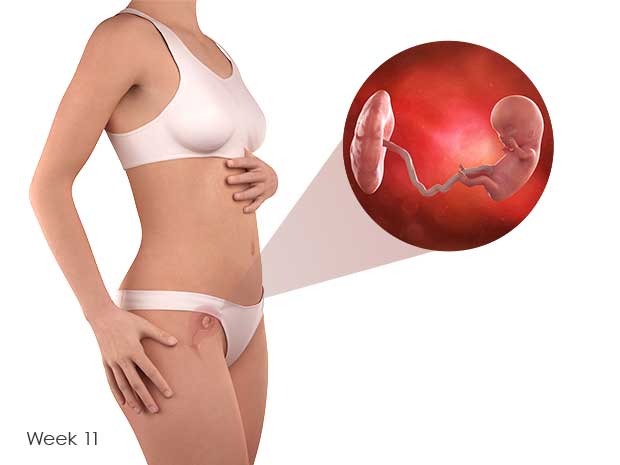
Week 11
Most pregnant women who are at a healthy weight should gain 25 to 35 pounds (11.33 to 15.87 kg) during pregnancy. Ask your health care provider how much weight you should gain.
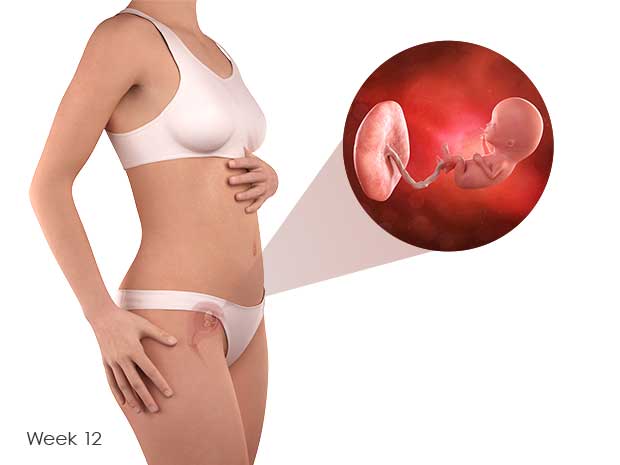
Week 12
Is your bra too tight? Many women go up one to two cup sizes during pregnancy. Buy new supportive bras and consider finding ones that double as nursing bras if you plan to breastfeed.
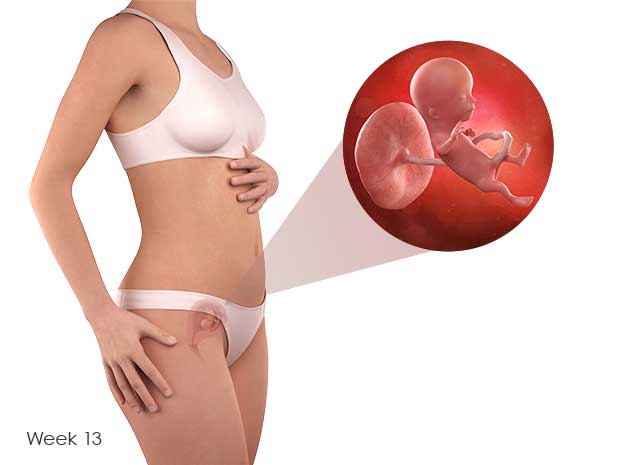
Week 13
Welcome to the second trimester! Fatigue or morning sickness may be ending. You should feel better in the days ahead. If you haven't already, talk to your doctor about doing gentle exercises.
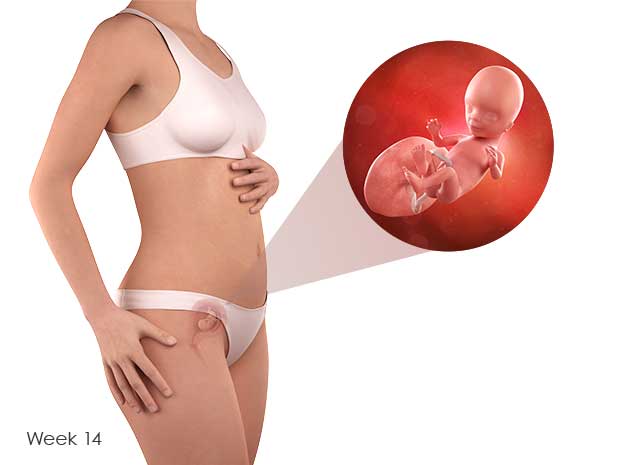
Week 14
Your baby weighs about 1.6 ounces (45 grams) and is about 3.5 inches (9 cm) long from crown to rump.
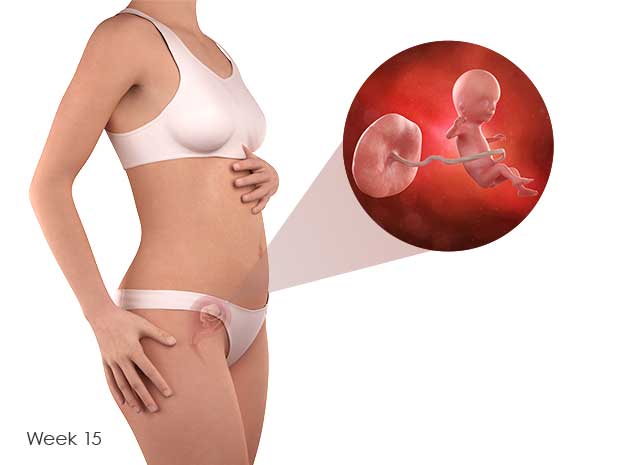
Week 15
Feeling happy one minute, teary-eyed the next? Thank your hormones. Improve your mood by getting enough rest, eating regularly, and exercising (if your doctor says it's OK).
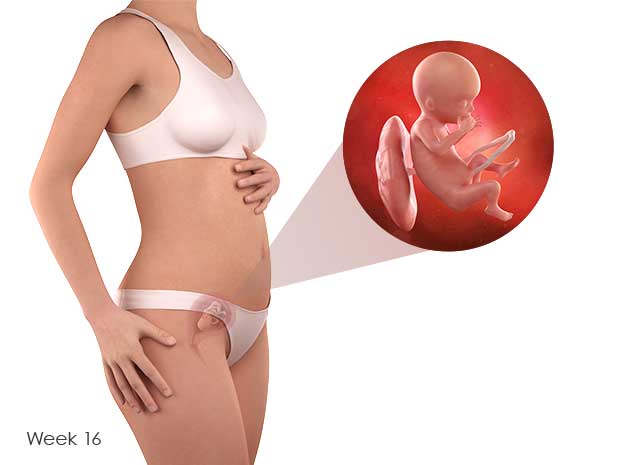
Week 16
It's called "baby brain" - many women report that pregnancy somehow makes them forgetful, clumsy, and unable to concentrate. Try to decrease the stress in your life and get plenty of sleep.
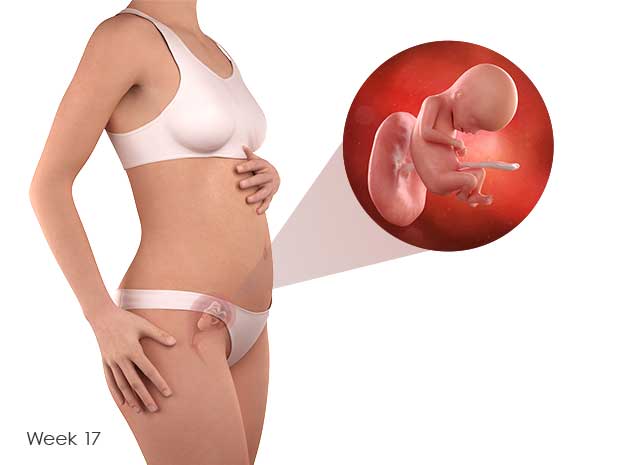
Week 17
Do people say you're glowing? Thank your pregnancy. More blood to your blood vessels and increased oil in your oil glands are giving you a rosy, smooth complexion.
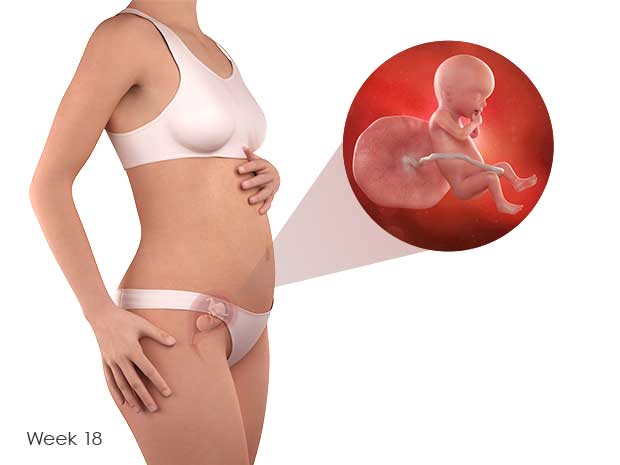
Week 18
Feeling any movement yet? If this is your first pregnancy, you'll likely feel baby's kicks as a gentle fluttering between 18 and 20 weeks. These first movements are called "quickening."
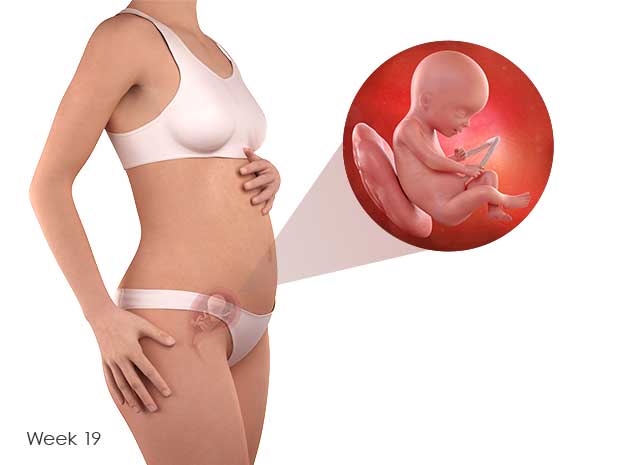
Week 19
Most women have their first ultrasound around this time. You might learn your baby's gender at the appointment. If you prefer to be surprised at birth, tell your ultrasound technician.
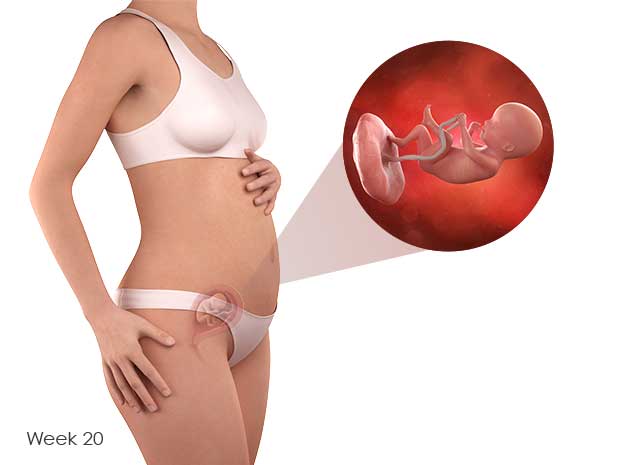
Week 20
You're halfway there! Twenty weeks into your pregnancy and your baby has grown to about 6.3 inches (16 cm) and weighs 11 ounces (312 grams).
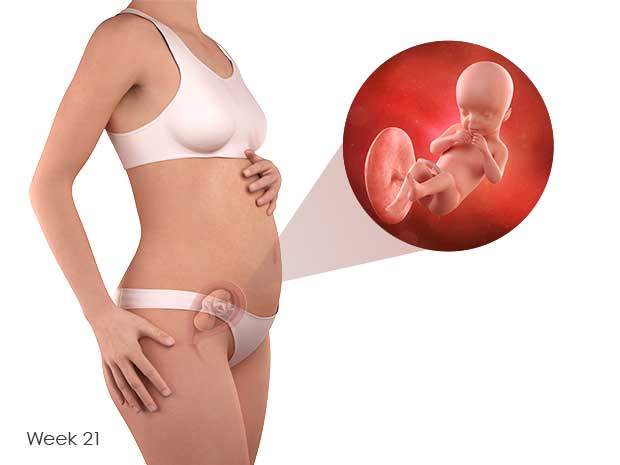
Week 21
Begin sleeping on your side. Sleeping on your back slows blood flow to your body and baby. If side-sleeping is uncomfortable, try placing a pillow between your knees and under your belly.
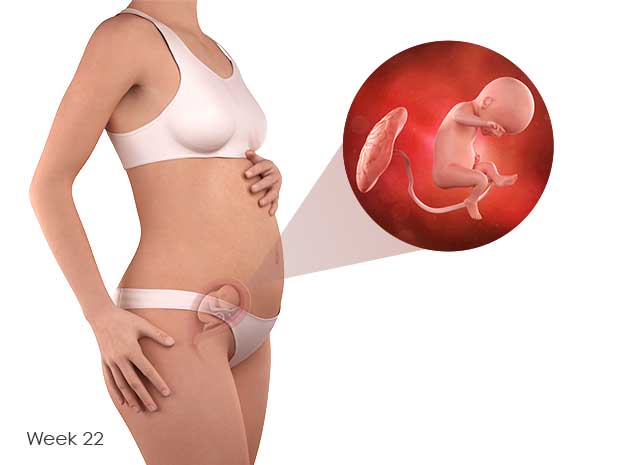
Week 22
You may be surprised by some pregnancy side effects, which can include varicose veins, gas, and skin blemishes. Ask your health care provider for advice on easing discomfort and handling skin problems.
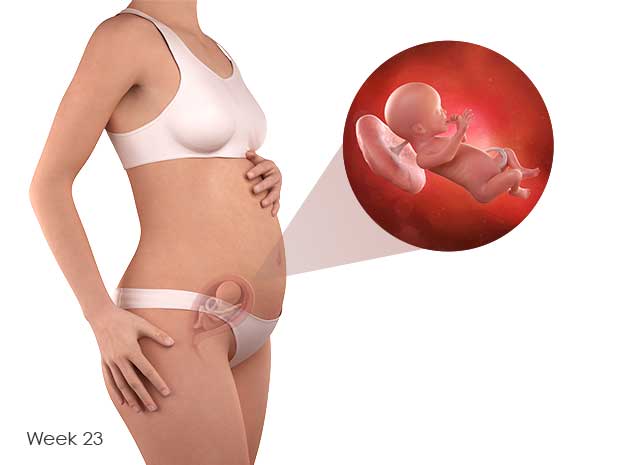
Week 23
Having trouble "going"? Your hormones can slow digestion and cause constipation. Exercise regularly, drink water, and eat high-fiber foods (like whole grains) to stay regular.
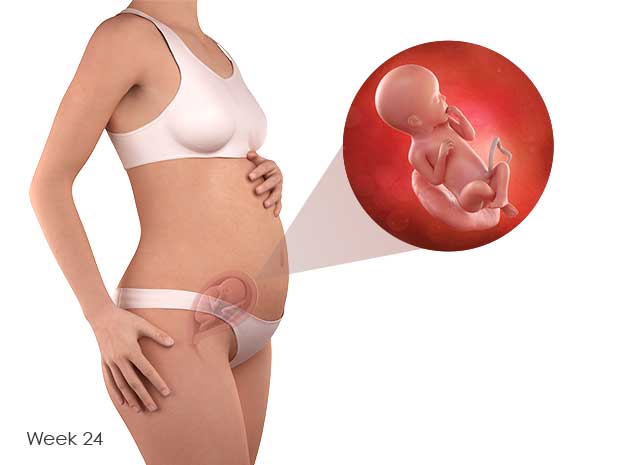
Week 24
Your health care provider may ask you to start counting your baby's kicks. It's a way to keep track of movements. If your baby is less active than usual, tell your provider right away.
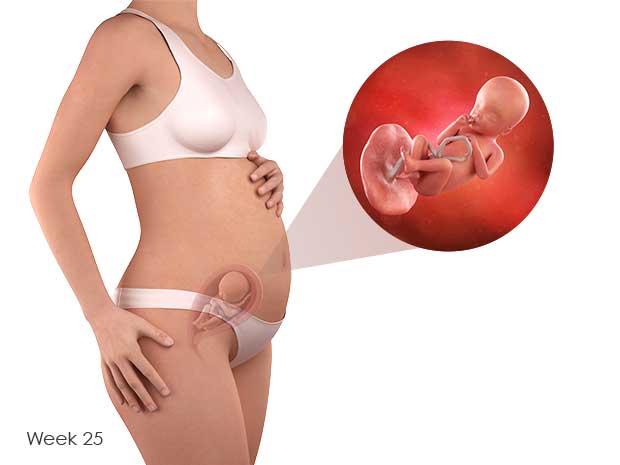
Week 25
Many pregnant women get heartburn (acid reflux). To ease discomfort, eat smaller meals and avoid foods that are spicy, acidic (like tomato sauce), or fatty.
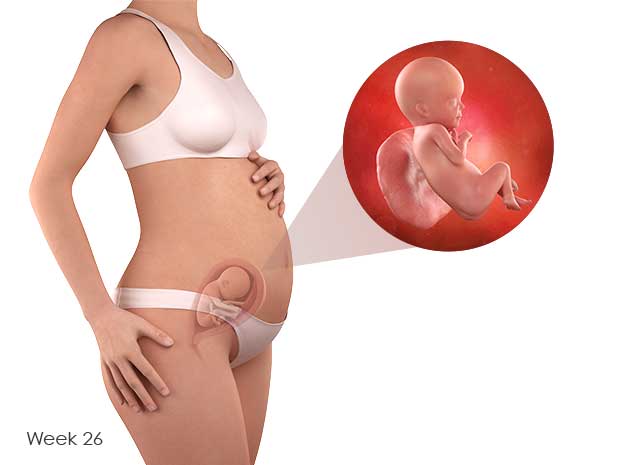
Week 26
If you're a first-time parent, consider signing up for childbirth classes to learn about what to expect with labor and delivery, breastfeeding, infant care, and more.
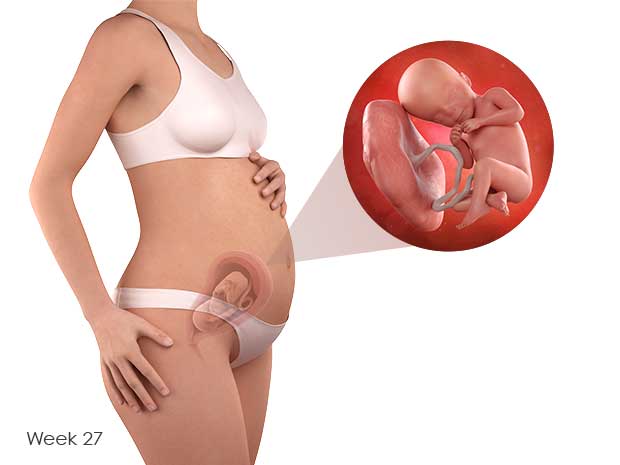
Week 27
Welcome to the third trimester! Your little one weighs about 2 pounds (907 grams) - and is starting to have a kick that can pack a punch!
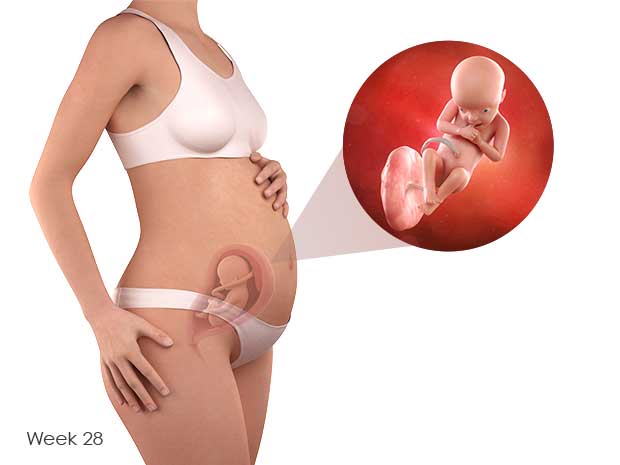
Week 28
Babies usually see their doctor a few days after leaving the hospital, so don't wait until the last minute to find someone you like. Start interviewing doctors now.
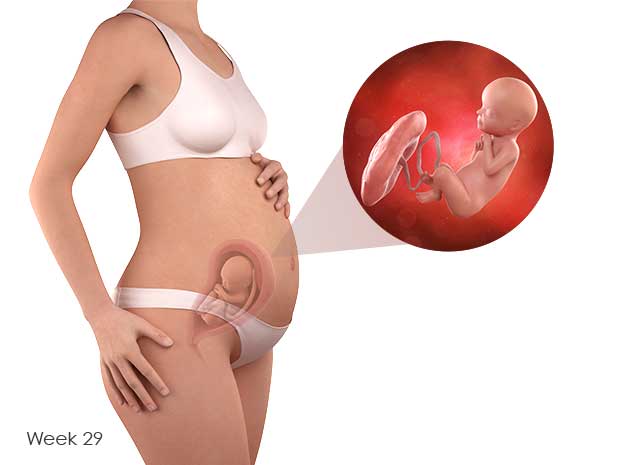
Week 29
Braxton Hicks contractions are "false" labor. They help your body prepare for childbirth. Ask your doctor how to tell them apart from real labor pains.
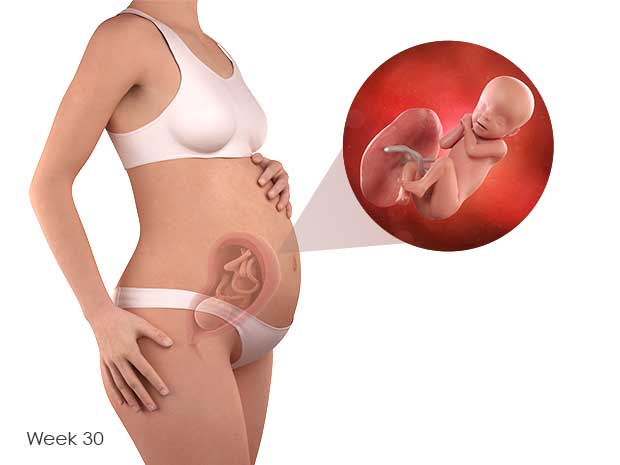
Week 30
Will you breastfeed or formula-feed? Breast milk is the best form of infant nutrition, but choosing to breastfeed is a personal choice. Talk to your health care provider if you need help deciding.
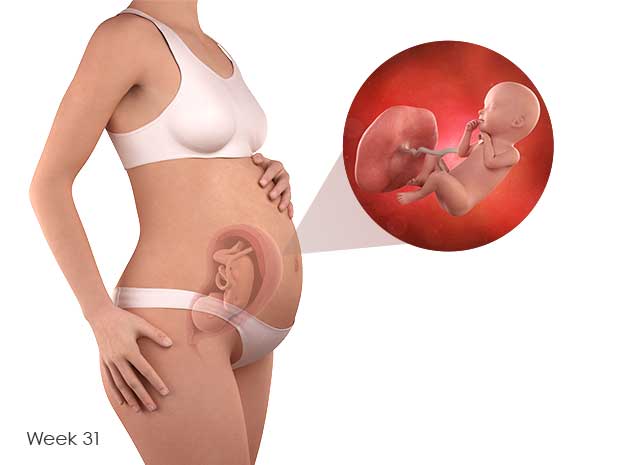
Week 31
Your breasts have started making colostrum. It's the pre-milk that nourishes your baby for the first few days of life. If your breasts are leaking now, breast pads can help protect your clothing.
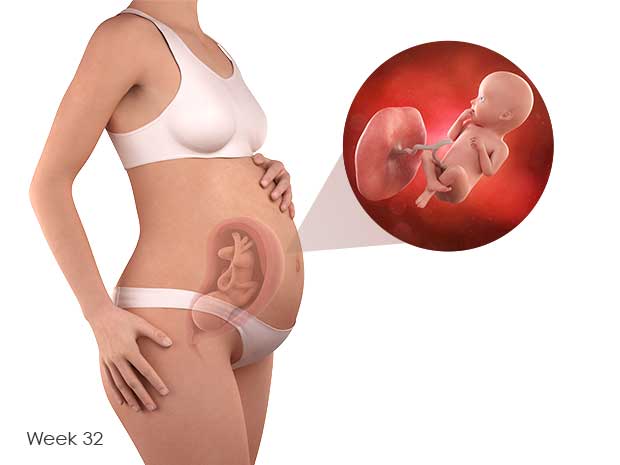
Week 32
A birth plan lets health care providers know your wishes before, during, and after birth. It can include any medicines for pain and who will be in the room during delivery. Consider writing your plan.
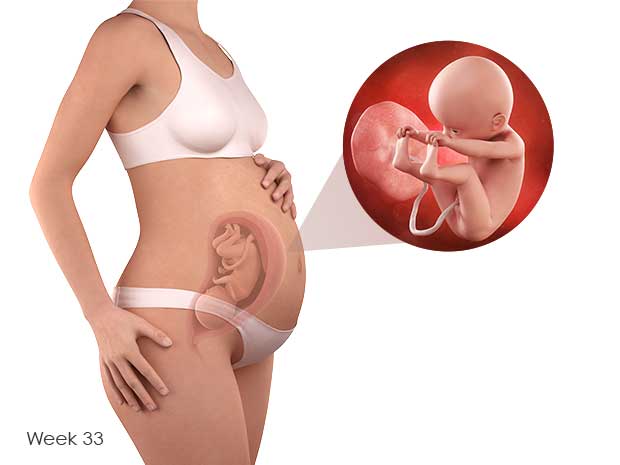
Week 33
Feeling sluggish? It's normal to feel tired toward the end of your pregnancy. Rest often and take naps when you can.
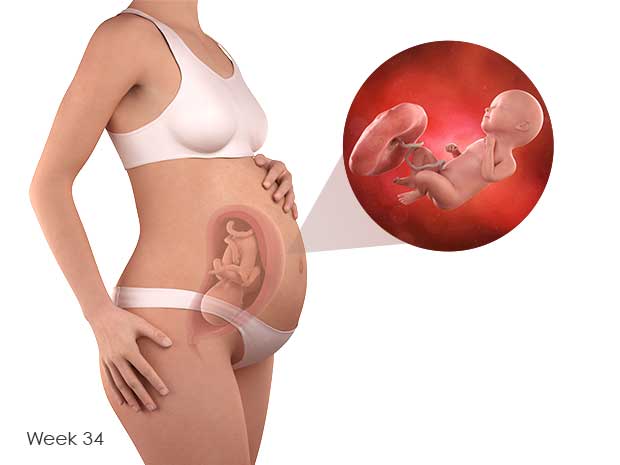
Week 34
Your baby will settle into position for delivery around this time. If your baby is breech (bottom-first instead of headfirst), don't worry. By delivery, your baby may turn on his or her own or be coaxed into position.
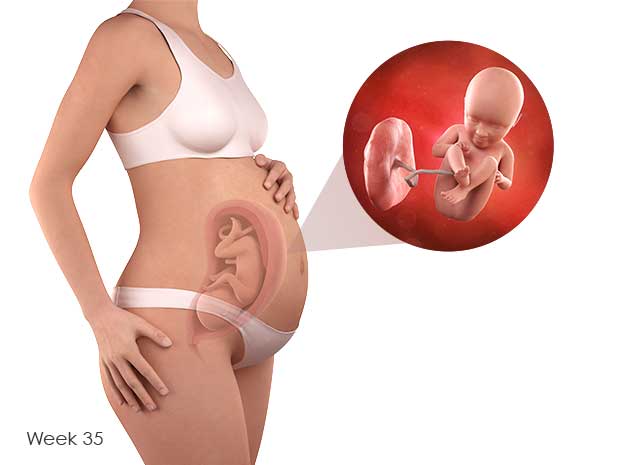
Week 35
From here on out, your baby will be gaining weight steadily. Get ready for that "kissable" baby fat!
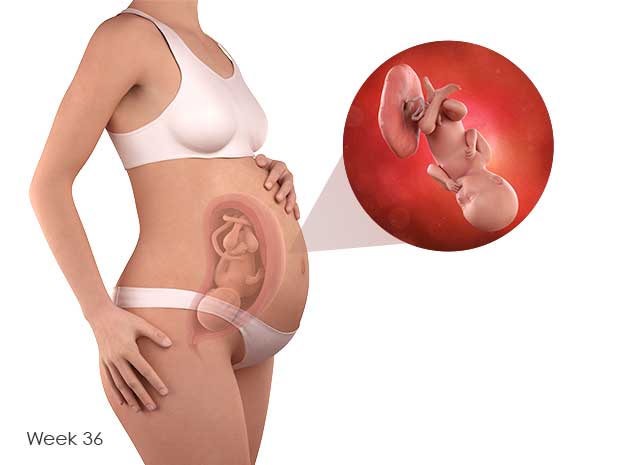
Week 36
Starting this week, you may begin to see your health care provider every week for an exam. He or she will ask about signs of labor, and may check to see if the cervix is thinning or opening.
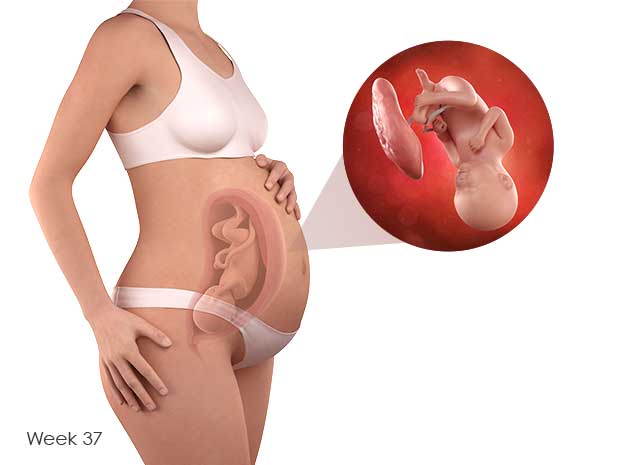
Week 37
Soon you may lose the mucus plug that sealed off your uterus from infection. The plug can be lost up to a few weeks before labor and is thick, yellowish, and may be tinged with blood.
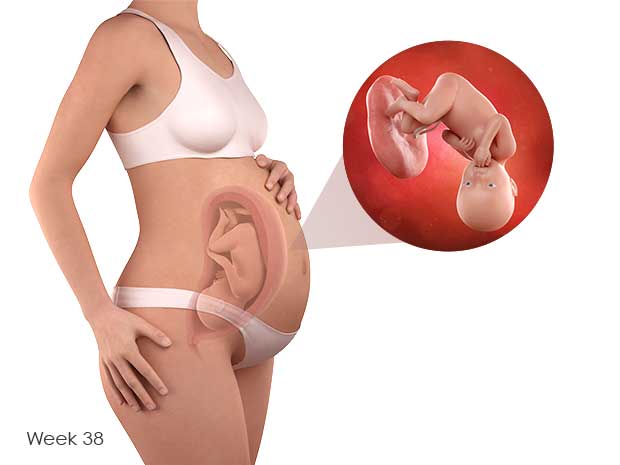
Week 38
Your baby has likely "dropped" into your pelvis. This is called lightening. Lightening puts pressure on your bladder and makes you run to the bathroom often.
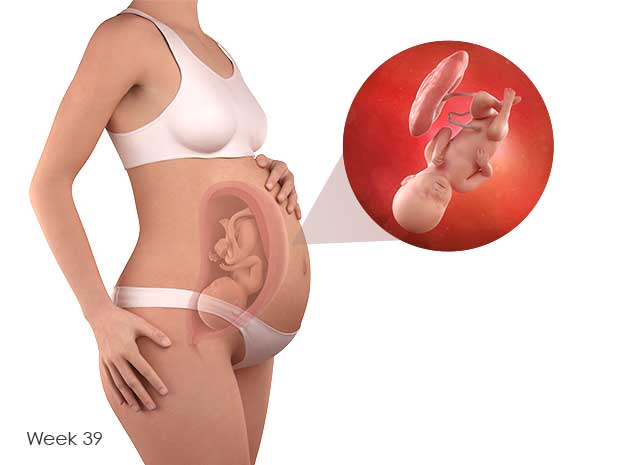
Week 39
Your baby is full-term! Your water may break at any time. It could be a large gush or a steady trickle. Call your health care provider if you think your water has broken.
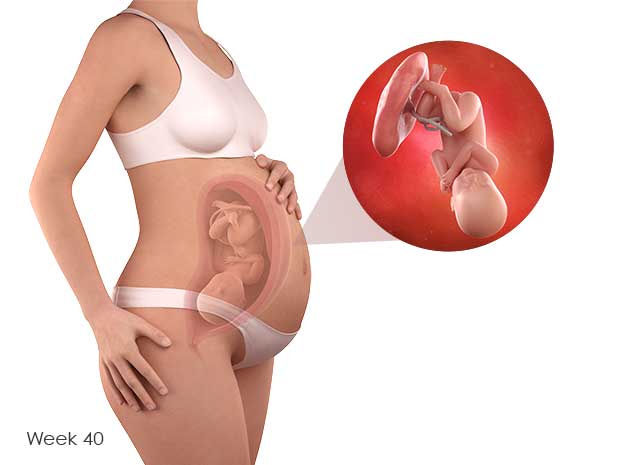
Week 40
Most women don't deliver on their due date. If you're not holding your precious one yet, don't worry - he or she will soon be here!

© 1995- The Nemours Foundation. KidsHealth® is a registered trademark of The Nemours Foundation. All rights reserved.
Images sourced by The Nemours Foundation and Getty Images.